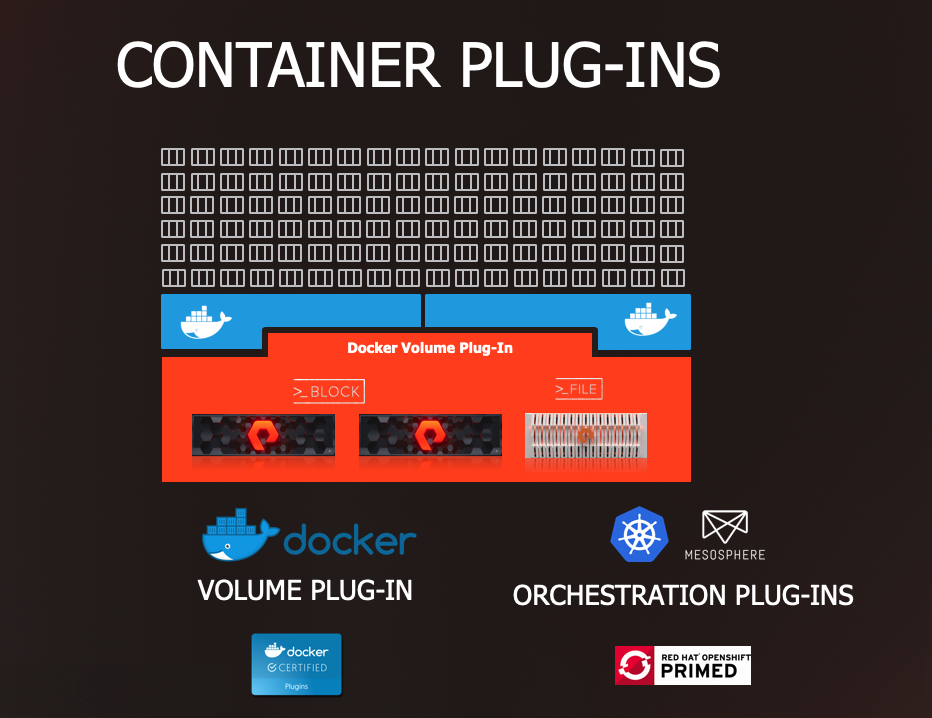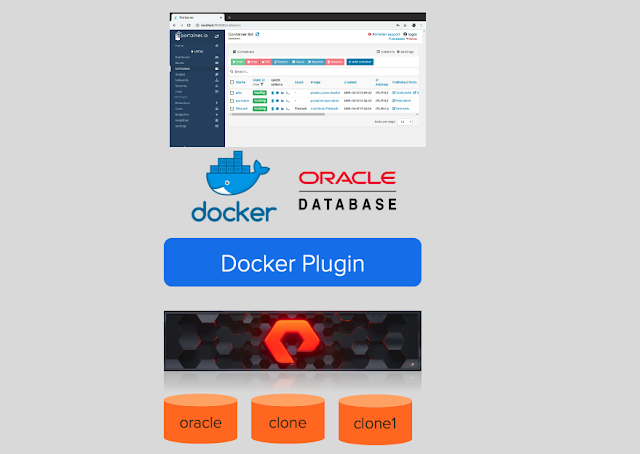Oracle 19c Database clones using the Pure Storage Docker plugin
Docker and containers have become a integral part of virtualization, being able to spin up containers almost instantly have transformed the way be build, develop and manage applications.
In this blog I will show you how we can rapidly create Oracle 19c container clones using the Pure Storage Docker plugin with persistent volumes and the new Oracle 19c container image on the Oracle Container Registry
https://container-registry.oracle.com/pls/apex/f?p=113:4:2886566670416#
Installing the Pure Plugin ( Latest version is 3.10 )
12:24:30 root@docker ~ # docker plugin install purestorage/docker-plugin:v3.10 --alias pure --grant-all-permissions
- Enter the Array Configuration in the /etc/pure-docker-plugin/pure.json file
{
"FlashArrays":[
{
"MgmtEndPoint":“192.168.111.130",
"APIToken":" 476d58bc-3c91-0d10-1b9e-0f31058c4621"
}
]
}
Check the plugin version
12:26:36 root@docker ~ # docker plugin ls
ID NAME DESCRIPTION ENABLED
a0b3cc51480d pure:latest Pure Storage plugin for Docker true
Login to the Oracle Container Registry
12:23:47 root@docker ~ # docker login container-registry.oracle.com
Username (cbannayan@purestorage.com):
Password:
Login Succeeded Note: If you don't have the image downloaded already, it will download as soon as you create the container Create the Persistent Volume using the Pure Docker Plugin
12:29:55 root@docker ~ # docker volume create --driver=pure:latest --opt size=5G --name=ora19c --label=orcl
ora19c
12:30:58 root@docker ~ → docker volume ls|grep ora19
pure:latest ora19c
Confirm the volume has been created on the FlashArray
12:32:36 root@docker ~ # ssh pureuser@192.168.111.130
pureuser@192.168.111.130's password:
Last login: Sun Jan 24 16:29:52 2021 from 192.168.112.1
Mon Feb 08 12:51:00 2021
Welcome pureuser. This is Purity Version 6.0.4 on FlashArray Pure-SYD-m20-1
**********************************************************************
WARNING: The user pureuser is still configured with the default password.
Please change the password now: pureadmin setattr pureuser --password
**********************************************************************
pureuser@Pure-SYD-m20-1> purevol list *ora19c*
Name Size Source Created Serial
docker-docker-ora19c 5G - 2021-02-08 12:48:50 AEDT A21265762DB64ECE000E1FB0
Check to see if any containers are running
12:36:44 root@docker ~ # docker ps
CONTAINER ID IMAGE COMMAND CREATED STATUS PORTS NAMES
Check for the Docker Oracle Image
12:46:58 root@docker ~ # docker image ls
REPOSITORY TAG IMAGE ID CREATED SIZE
container-registry.oracle.com/database/enterprise 19.3.0.0 6ee1b2e4403f 2 months ago 7.87GB
Create the Oracle 19c Container
12:48:20 root@docker ~ # docker run -d --name zz-ora19c --mount source=ora19c,target=/opt/oracle/oradata container-registry.oracle.com/database/enterprise:19.3.0.0
155481d8de4e37eb7033aead74267b7b5220c51f1415e1912b260d9d0d681ce4
12:49:06 root@docker ~ # docker ps
CONTAINER ID IMAGE COMMAND CREATED STATUS PORTS NAMES
155481d8de4e container-registry.oracle.com/database/enterprise:19.3.0.0 "/bin/sh -c 'exec $O…" 27 seconds ago Up 22 seconds (health: starting) zz-ora19c
Log into the container and confirm the database is running on the new Volume
12:49:25 root@docker ~ # docker exec -it 155481d8de4e bash
[oracle@155481d8de4e ~]$
[oracle@155481d8de4e ~]$ ps -ef|grep pmon
oracle 506 1 0 01:49 ? 00:00:00 ora_pmon_ORCLCDB
oracle 647 601 0 01:51 pts/0 00:00:00 grep --color=auto pmon
[oracle@155481d8de4e ~]$
[oracle@155481d8de4e ~]$ df -k
Filesystem 1K-blocks Used Available Use% Mounted on
overlay 68328860 56622648 11706212 83% /
tmpfs 65536 0 65536 0% /dev
tmpfs 2922740 0 2922740 0% /sys/fs/cgroup
shm 65536 0 65536 0% /dev/shm
/dev/mapper/ol-root 68328860 56622648 11706212 83% /etc/hosts
/dev/mapper/3624a9370a21265762db64ece000e1fb0 5232640 266060 4966580 6% /opt/oracle/oradata
tmpfs 2922740 0 2922740 0% /proc/acpi
tmpfs 2922740 0 2922740 0% /proc/scsi
tmpfs 2922740 0 2922740 0% /sys/firmware
We can see that our persistent volume with the serial number ending in fb0 is mount on /opt/oracle/oradata, the same service number as the volume ora19c
Log into the Oracle Database
[oracle@155481d8de4e ~]$ sqlplus / as sysdba
SQL*Plus: Release 19.0.0.0.0 - Production on Mon Feb 8 01:52:19 2021
Version 19.3.0.0.0
Copyright (c) 1982, 2019, Oracle. All rights reserved.
Connected to:
Oracle Database 19c Enterprise Edition Release 19.0.0.0.0 - Production
Version 19.3.0.0.0
SQL> select name from v$database;
NAME
---------
ORCLCDB
SQL> select name from v$datafile;
NAME
--------------------------------------------------------------------------------
/opt/oracle/oradata/ORCLCDB/system01.dbf
/opt/oracle/oradata/ORCLCDB/sysaux01.dbf
/opt/oracle/oradata/ORCLCDB/undotbs01.dbf
/opt/oracle/oradata/ORCLCDB/users01.dbf
Create a table in the database
SQL> create table table1 as select * from dba_users;
Table created.
SQL> select count(8) from table1;
COUNT(8)
----------
36
SQL>
Now that we have our first database container running, let's use this as our GOLD image to create clones from, Using Docker and the Pure Storage Plugin we can create rapid clones of our containers in seconds. Now lets create a clone of our database persistent volume ora19c
Create the clone volume using Docker
12:57:09 root@docker ~ # docker volume create --driver=pure --name ora19clone -o source=orac19c
ora19clone
12:57:31 root@docker ~ #
12:57:53 root@docker ~ # docker volume ls |grep ora19clone
pure:latest ora19clone
Confirm the clone has been created from the source
pureuser@Pure-SYD-m20-1>
pureuser@Pure-SYD-m20-1> purevol list *ora19*
Name Size Source Created Serial
docker-docker-ora19c 5G - 2021-02-08 12:48:50 AEDT A21265762DB64ECE000E1FB0
docker-docker-ora19clone 5G docker-docker-ora19c 2021-02-08 14:16:54 AEDT A21265762DB64ECE000E2073
As you can see, the ora19clone is the same 5G in size and its source is ora19c
Create the container using the cloned volume
02:02:21 root@docker ~ # docker run -d --name zz-ora19c-clone --volume-driver pure -v ora19clone:/opt/oracle/oradata container-registry.oracle.com/database/enterprise:19.3.0.0
344e25d5c357effdbe6b8ddf901f8e36d90faac5430e12cbaa41bfafeec0b075
02:02:35 root@docker ~ #
log into the container and confirm Oracle has started and cloned
02:03:20 root@docker ~ # docker ps
CONTAINER ID IMAGE COMMAND CREATED STATUS PORTS NAMES
344e25d5c357 container-registry.oracle.com/database/enterprise:19.3.0.0 "/bin/sh -c 'exec $O…" 54 seconds ago Up 48 seconds (health: starting) zz-ora19c-clone
b86a816fe327 container-registry.oracle.com/database/enterprise:19.3.0.0 "/bin/sh -c 'exec $O…" 11 minutes ago Up 11 minutes (healthy) zz-ora19c
02:03:23 root@docker ~ # docker exec -it 344e25d5c357 bash
[oracle@344e25d5c357 ~]$ df -k
Filesystem 1K-blocks Used Available Use% Mounted on
overlay 68328860 56338860 11990000 83% /
tmpfs 65536 0 65536 0% /dev
tmpfs 2922740 0 2922740 0% /sys/fs/cgroup
shm 65536 0 65536 0% /dev/shm
/dev/mapper/ol-root 68328860 56338860 11990000 83% /etc/hosts
/dev/mapper/3624a9370a21265762db64ece000e2073 5232640 3895484 1337156 75% /opt/oracle/oradata
tmpfs 2922740 0 2922740 0% /proc/acpi
tmpfs 2922740 0 2922740 0% /proc/scsi
tmpfs 2922740 0 2922740 0% /sys/firmware
SQL> select count(*) from table1;
COUNT(*)
----------
36
SQL>
The Oracle Container has started without doing a new install and the table "table1" we created is present.




Comments
ServiceNow Course Online
Best ServiceNow Online Training